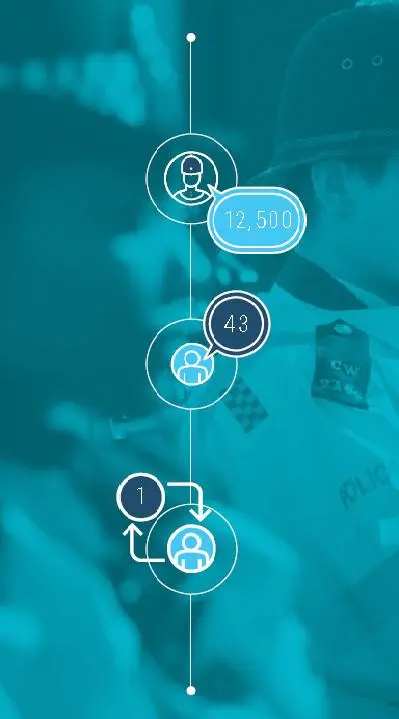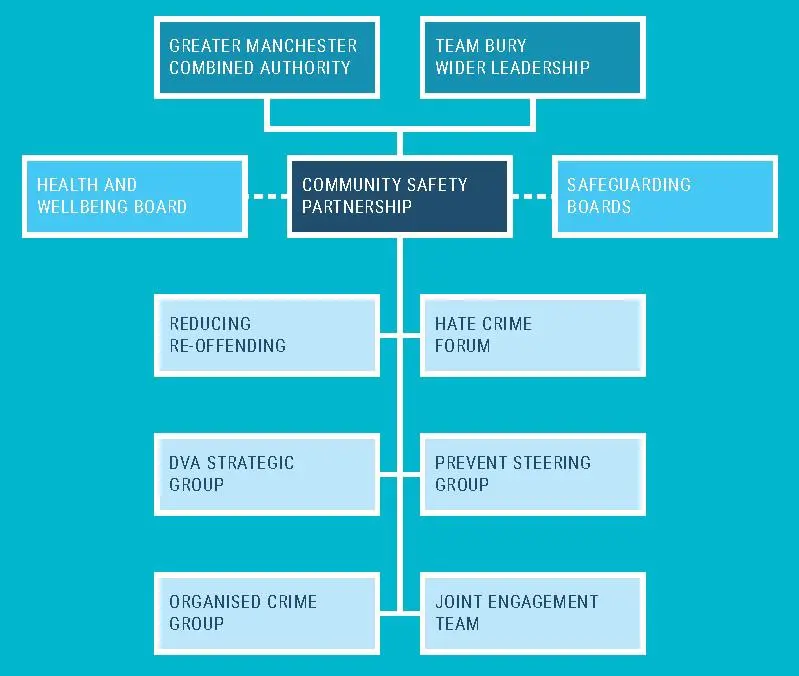Bury Community Safety Plan 2019 - 2021 [10Mb]
Forward

No single agency can deliver on the complexities of keeping communities safe and so Bury's Community Safety Partnership (CSP) brings agencies together to facilitate a joined-up approach.
The CSP has faced some significant new challenges in recent years; most significantly, there has been a change in the issues presented to partners to address, compounded by substantial resource pressures. That being said, Bury is a very safe town in which to live and work and we are confident that this Plan will enable the town to continue to thrive.
The Plan is a living, working document. The priorities represent a real but realistic challenge for the lead agencies and other groups and organisations participating alongside them. The priorities and key objectives set out in this plan are based upon an assessment of crime and disorder issues across the Borough and reflect the views of the community on matters that need to be prioritised.
Chief Superintendent Stuart Ellison (Chair of the Community Safety Partnership),
Councillor Sharon Briggs (Cabinet Member for Communities).
Introduction
The Crime and Disorder Act 1998 places obligations on the Community Safety Partnership to produce a Community Safety Plan to outline how all partners intend to work together to impact upon crime and disorder, substance misuse and reduce re-offending in the local area.
The Crime and Disorder Act 1998 changed the way crime and anti-social behaviour was to be tackled, as it is recognised that in order to be effective, agencies needed to work together to address the issues collectively.
Each local area formed a Crime and Disorder Reduction Partnership (CDRP) which are now called Community Safety Partnerships (CSPs).
Who are Team Bury's Community Safety Partnership?
Team Bury's CSP is made up of key partners that must ensure specific obligations such as public engagement and delivery of an action plan are met.
Our partners are: Greater Manchester Police, Bury Council, Greater Manchester Fire & Rescue Service, Probation Service, Community Rehabilitation Company, HM Prison Service, Six Town Housing, Youth Offending Service, Bury Clinical Commissioning Group, Public Health
We also work with a large number of other public and private sector partners as well as voluntary and community groups to collectively implement and deliver initiatives that will help all areas of Bury become a safe place to live, work and visit.
How does the plan link with the regional context?
This strategy aligns closely with the Mayor of Greater Manchester's 'Standing Together' Police & Crime Plan. This enables us to co-ordinate resources more effectively and undertake regional work where beneficial.
Each of the priorities directly links to one of the three over-arching goals identified in the Standing Together Plan:
- To keep people safe - for those who live, work, socialise and travel in Greater Manchester, as well as protecting those who are vulnerable.
- To reduce harm and offending - preventing anti-social and criminal behaviour by intervening earlier and rehabilitating offenders.
- To strengthen communities and places - by helping to build resilient communities and strengthening the delivery of public assets
About Bury
According to the 2011 census, the population of Bury has increased by 4360 since 2001. Since 2015, it is estimated that more people moved out of Bury than moved in from elsewhere, and more people were born in Bury than died.
The 2011 census results for Bury put our population at 185,060, whilst the 2016 figures show the population at 189,330; showing a 2% increase in 5 years. By 2020 the population is estimated to reach approximately 193,400.
The age profile of the town's population has changed over time, with those aged 65+ having increased by 26% between 2001-2016. In 2016 38.2% of Bury's population were aged under 16 or over 64, and based on current projections it is anticipated that by 2020 this will reach 39.2%.
During the period 2007-2017 there were just over 3,100 new dwellings built in Bury, with 33% of these being built in Radcliffe. The average in the past ten years has been 312 new dwellings per year, whilst the past five years has seen an average completion rate of 357 new dwellings per annum.
Bury has an increasingly diverse mix of ethnic and religious communities. Latest census figures show that in 2011 10.8% of residents described themselves as belonging to a mixed, black, Asian or other ethnic persons group, compared to 6.1% in 2001. There have been significant increases in both Asian and black ethnic groups.
There is also a large proportion of the population in Bury that identify their religion as Jewish. 42% of Jewish people in Bury live in the Sedgley area; these people constitute 2.4% of Bury's entire population.
There is a comparative lack of quantitative data on lesbian, gay, bisexual and transgender (LGBT) people and communities in Bury as information on sexual orientation and gender identity was not collected at the last census. By applying national data from 2016 to Bury's population figures, it is probable that there are approximately 13,060 people living in Bury (6.9%) that do not identify themselves as heterosexual / straight, some will also identify other than Cis-gender (a different gender to the one in which they were born.) or Intersex (Born with several variations in sex characteristics).
Information on civil partnerships was collected in the 2011 Census, with 253 people in Bury responding that they were in a registered same-sex civil partnership.
Although levels of deprivation have reduced in Bury between 2010-2015, Bury is about average for England at local authority levels of deprivation. It is ranked 122nd most deprived of the 326 districts in England, and of the 10 areas in Greater Manchester, Bury is the 8th most deprived (i.e. 3rd least deprived) Compared with the overall Index of Multiple Deprivation (IMD) rank, Bury is relatively less deprived for: education; skills and training; and barriers to housing and services, and is more relatively deprived for: employment; and health and disability.
Demand for safety in Bury

On an average day in Bury:
- There is a Police Officer on duty for every 12,500 people
- There are 11 incidents of Domestic Abuse
- There are 6 incidents of Criminal Damage or Arson
- Community Rehabilitation Company will supervise a total caseload of 450 offenders
- The Police deal with 4 incidents relating to Mental Health
In an average month:
- 43 Hate Crime incidents will occur
- There are 235 Public Order offences
- 2 Anti-Social Behaviour Contracts are issued
- The Community Rehabilitation Company will deliver rehabilitation group work to 104 offenders
- 30 defective fire alarms are replaced by The Fire Service
- There are 150 violent crimes resulting in an injury
In an average year:
- There is 1 Homicide
- 236 new cases of Anti-Social Behaviour are dealt with by the Local Authority.
- 867 Safe and Well Visits are delivered by the Fire Service
- There are 912 Road Traffic Collisions reported to the Police.
- There are 804 missing person reports
- 66 families are supported by the Children's and Young Persons Domestic Violence Worker
Key achievements for 2014-17
Some key achievements throughout the life of the last Plan include:
Protecting vulnerable people:
- Increased frequency of Multi-Agency Risk Assessment Conference (MARAC) meetings to provide quicker interventions for victims of domestic abuse
- Increased the number of Independent Domestic Violence Advocates dealing with high-risk victims
- Introduced an early-intervention process for standard-risk victims of domestic abuse to reduce the risk of escalation
- Launched a Domestic Abuse Strategy, which was revised in 2018.
- Piloted a Behaviour Change programme to work with perpetrators of domestic abuse
- Launched a new emergency accommodation project for victims of domestic abuse
- Following a violent disorder neighbourhood police teams commenced a programme of working with the residents of a caravan park in order to forge stronger relationships with this isolated community.
- A Children's and Young Persons Domestic Violence Worker was appointed to support families where domestic violence and abuse was a factor.
- More than 100 people have completed a Domestic Abuse Support Group session at Children's Centres.
Transforming justice:
- At the end of 2015 Bury began a pilot to divert female adult offenders out of the criminal justice system. The scheme is run in conjunction with Women of Worth who are a GMCA funded charity supporting vulnerable women. In the last two and a half years, 81 female adult offenders have been referred to the scheme for support as an alternative to prosecution. The scheme has seen some significant successes, not only reducing the re-offending rate (8%) lower than that of the national average (19%) but also identifying domestic abuse as a link to offending.
- Co-location of services with Police, Community Rehabilitation Company (CRC) and Probation has led to improved flow of information and enhanced Partnership working.
Reducing crime and Anti-Social Behaviour (ASB):
- ASB was down 26% in the 12 months to April 2018
- Developed place-based working approaches to manage ASB and crime
- Community Groups funded using Proceeds of Crime monies to fund schemes with a focus on a reduction in ASB.
Resilient communities:
- Developed a co-ordinated approach across Partnership to Social Media campaigns
- Ran a number of campaigns across Hate Crime, ASB and Domestic Abuse both across Greater Manchester footprint and more local, targeted campaigns
- Undertook a significant amount of training with schools, professionals and in communities around Hate Crime, Prevent, Cohesion and Domestic Abuse
- Worked with Town Centre colleagues to regain Purple Flag accreditation for Bury Town Centre
- Opened a number of Hate Crime Reporting Centres across Bury. We now have more Hate Crime Reporting Centres per capita than any other area in Greater Manchester. Details of reporting centres are available at Hate crime.
- Relaunched Strategic Interfaith Group as Bury Faith Forum which is now co-owned and produced by all Partners
Priorities
- Protect and support vulnerable people
- Putting victims first
- Reduce re-offending
- Build stable, cohesive communities
- Develop a partnership approach to community safety
Delivering the plan
Delivery will be via an Action Plan developed through the Community Safety Partnership which will set out what each of the Implementation Groups detailed at the bottom of the structure will do to achieve the objectives identified under the 5 Priorities.
A key action of the Partnership is to co-ordinate delivery, bring partners together and identify resources and skills in order to achieve the best possible outcomes.
Performance management
The action plan will be built around a robust outcome-based performance management framework to review and monitor progress. The plan will be reviewed and refreshed annually.
Structure

The Community Safety Partnership sits alongside the Health and Wellbeing Board and the Safeguarding Boards, under the Greater Manchester Combined Authority and the Team Bury Wider Leadership.
The Community Safety Partnership contains the following:
- Reducing re-offending
- Hate crime forum
- DVA strategic group
- Prevent steering group
- Organised crime group
- Joint engagement team
If you need help understanding this information / document, please contact us.